In this article:
The skin is the largest organ of the body. Multiple internal and external factors can affect the skin’s appearance, and it is necessary to prevent exposure to harmful elements to preserve its health and glow.
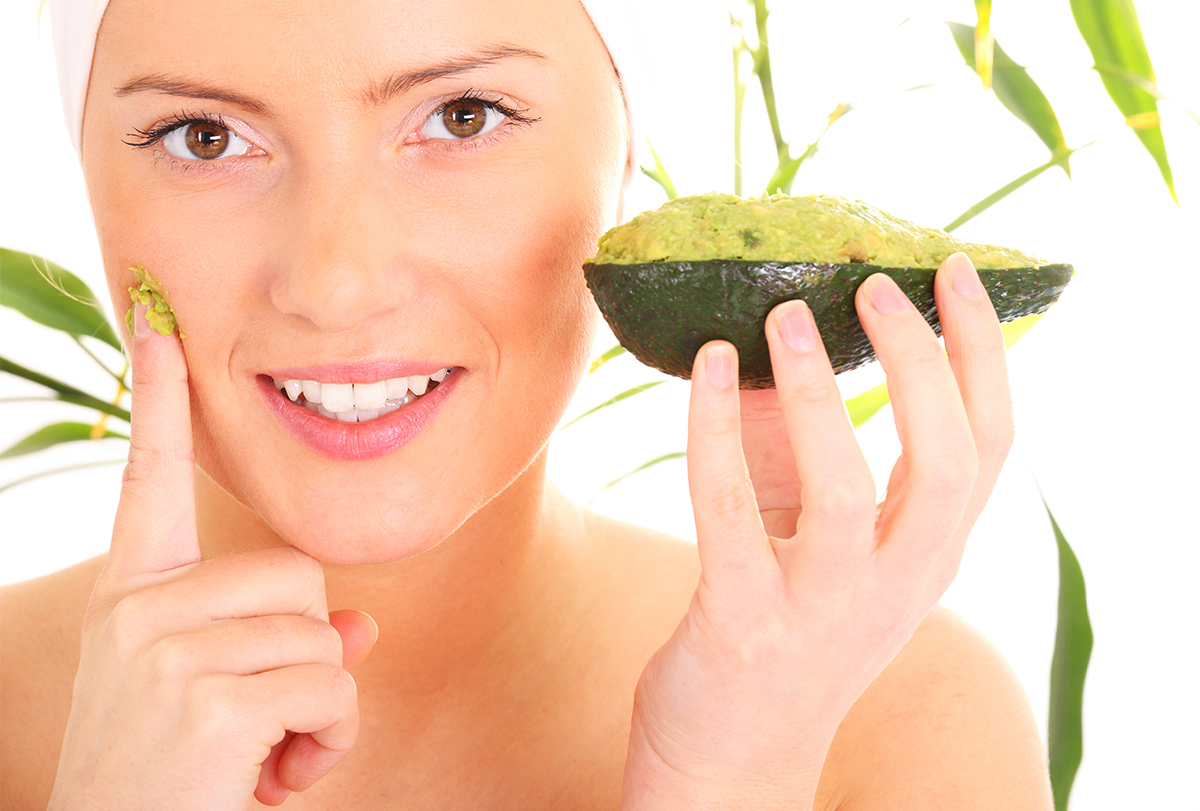
The skin is often a reflection of your mental and physical health. For instance, stress can lead to acne and dark circles, and dehydration results in dry and flaky skin.
Also, your face appears pale during illness, and excessive eating or drinking may cause puffiness. Adverse external factors, together with such internal causes, may result in:
- Premature aging
- Immune dysfunction
- Sensitivity and irritation
- Imbalanced epidermal homeostasis
- Other skin problems
To avoid the development of these conditions, you must proactively take care of your skin. Generally, a daily skin care regimen, regular exercise, a healthy diet, and a happy mind are the key to naturally glowing skin.
Easy-to-Make Face Masks to Pamper Your Skin
The skin care routine of different individuals varies with the products and application process. However, a common step in the majority of these routines is the use of a facial mask.
Facial masks are full of active ingredients that are beneficial to skin health. These components usually help hydrate, relax, and rejuvenate the skin while delaying the formation of wrinkles, age spots, and fine lines.
Know the Ingredients
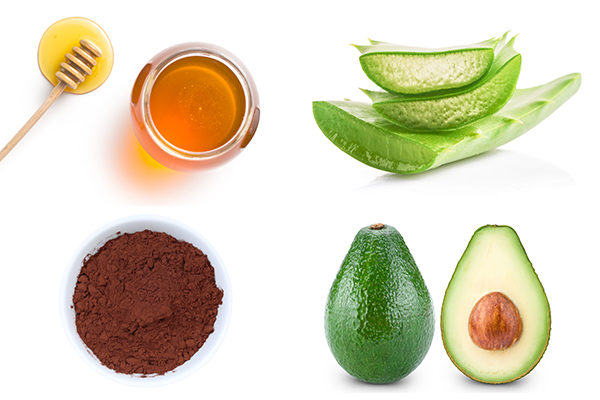
Here is a list of the various ingredients, along with their benefits, which you can use in making facial masks that will make your skin glow:
1. Honey
Honey helps prevent bacterial infections, sun damage, and premature wrinkling and also tightens the pores.
It contains a wide range of nutrients, including proteins, vitamins, amino acids, enzymes, and minerals. These nutrients provide humectant, emollient, and soothing effects. Honey also helps regulate the pH and maintains the youthfulness of the skin. (1)(2)
2. Aloe vera
Aloe vera has been exploited for its medicinal, health, beauty, and skin care benefits for long. The gel in the leaves acts as a skin protectant against radiation damage.
It also stimulates fibroblasts to increase the production of collagen and elastin fibers, therefore enhancing skin elasticity and reducing wrinkles. (3)(4)
3. Cocoa and its products
Cocoa and cocoa products are full of nutritional therapeutic phytocompounds that act as anti-inflammatory and antioxidant agents. They stimulate the body’s photoprotective mechanisms, which are vital for maintaining skin health.
Studies demonstrate that cocoa can be potentially used for the treatment and prevention of skin ailments. (5)(6)
4. Avocado
Avocado pulp is made up of around 60% oil, 7% skin, and 2% seed and is considered to be an excellent addition to your skin care regimen. It has anti-aging properties, which aid in reducing wrinkles. It also helps improve damaged, dry, and chapped skin. (7)(8)
Disclaimer: Since your facial skin is extremely thin and delicate, it can get easily irritated by any new topical ingredient. So to rule out any adverse skin reactions such as burns and rashes, first perform a patch test of the mask on the underside of your arm.
If irritation occurs, avoid its use. Also, if you are allergic to any of the ingredients in the remedy, do not use it. People with sensitive skin are advised to take special precautions before trying out any topical remedy.
DIY Recipes for At-Home Facial Masks
The following do-it-yourself face masks made out of natural ingredients will help give a radiant glow to your skin. They may be a worthy addition to your skin care regimen and should be given a try.
1. Cocoa hydration mask
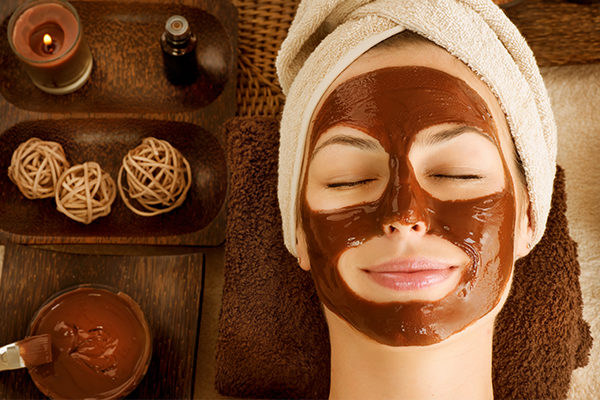
This three-ingredient facial mask comprises all-edible components, which indicate its safety for topical application.
Ingredients:
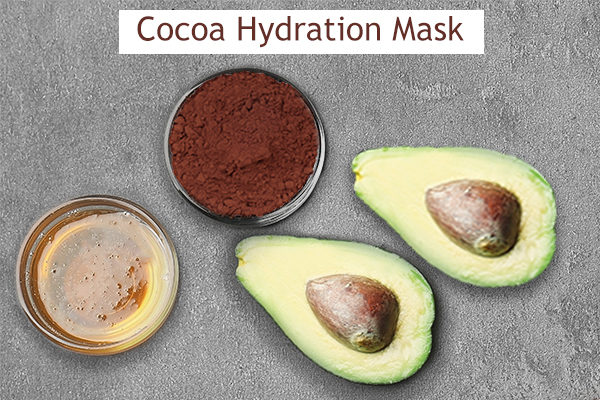
- One avocado
- 2 tbsp cocoa powder
- 1 tbsp honey
Directions:
- Cut out a quarter of the avocado into a clean bowl.
- Mash the pulp into a fine paste.
- Mix in the honey and cocoa powder properly.
- Clean and pat your skin dry.
- Apply the mask and leave it on for 10 minutes.
- Rinse your face with warm water.
- Apply your regular moisturizer.
2. Honey, avocado, and aloe vera mask
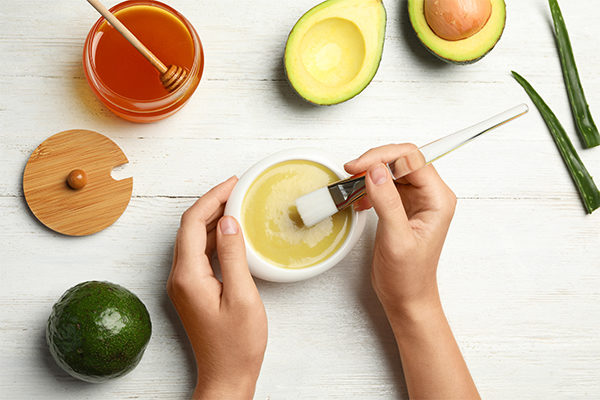
This facial mask is highly useful for enhancing the health, youthfulness, and beauty of your skin, giving it a dewy glow.
It is a lightweight mask that is rich in vitamins and antioxidants that nourish and hydrate the skin. Honey helps cleanse, soothe, and heal the skin. Aloe vera can help make the skin soft and radiant.
Ingredients:
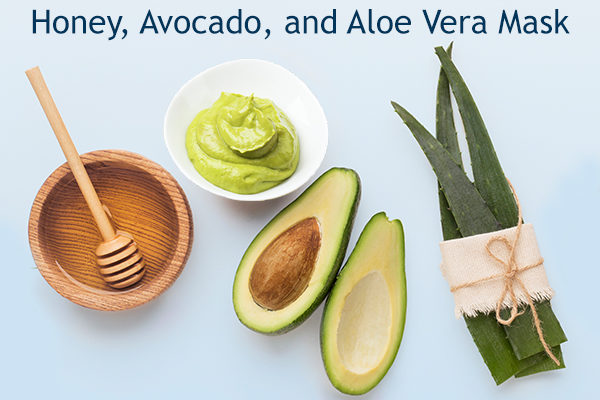
- 1 tbsp honey
- 2 tsp aloe vera gel
- 1 tbsp avocado pulp
Directions:
- Add the honey, aloe vera gel, and avocado in a clean bowl.
- Mix the ingredients to form a smooth and thin paste.
- Use a face scrub to clean your skin.
- Spread the mask on your face and leave it on for 15–20 minutes.
- Wash your face with lukewarm water.
- Apply a face cream.
How to Use the Masks
For the best results, it is essential to prepare your skin before applying the facial masks. Proper application of the masks will enhance its effects, leaving your skin soft, plump, and shining.
Follow these steps when using facial masks:
- Cleanse and wash your face properly before applying the mask.
- Pat your skin dry, leaving it slightly wet. The water will help lower the greasiness of the mask.
- Put a layer of the mask on your face and neck in a circular motion, like a scrub.
- Leave it on for the specified time.
- Wash off the mask using lukewarm water.
- Use a toner and moisturizer if the skin feels oily.
- Use the masks once a week.
Possible Adverse Effects
Aloe gel-based formulations are generally safe for topical use. Honey has a wide range of oral (as a sweetener, cough suppressant) and topical applications (for minor sores, wounds), which are usually harmless for adults and older children.
Similarly, cocoa butter has been safely used as a base for ointments and suppositories. Avocado is likely to be safe for use on the skin for up to 3 months. However, an allergy to any of the ingredients may be deleterious. In such a case, the use of the mask should be avoided.
Therefore, it is necessary to take precautions before using these masks, and it is always recommended to perform a patch test first.
Note: These homemade masks are composed of all-natural ingredients. It is vital to mix the materials carefully and perform a patch test before full-scale application to the face. Refrain from using these masks if you are allergic to any of the ingredients.
Final Word
The foundation of healthy and beautiful skin lies on the inside. The types of food you eat have a notable role in the appearance of your skin.
Consuming fresh fruits and vegetables helps enhance your general health while giving a radiant, youthful appearance to your skin.
Including natural, organic, chemical-free produce commonly found in the kitchen in your skin care regimen may further enhance your skin health.
In addition to the health benefits, these all-natural facial masks are more cost-effective than commercial sheet masks.
Also, you can make a wide variety of masks using different combinations of natural ingredients and even customize them to suit your skin type.
- Was this article helpful?
- YES, THANKS!NOT REALLY


